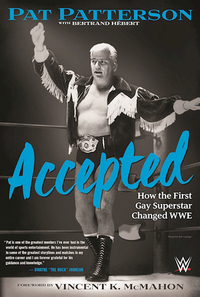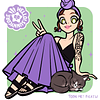Take a photo of a barcode or cover
20 reviews for:
Accepted: How the First Gay Superstar Changed WWE
Pat Patterson, Bertrand Hebert, Vince McMahon Jr.
20 reviews for:
Accepted: How the First Gay Superstar Changed WWE
Pat Patterson, Bertrand Hebert, Vince McMahon Jr.
This was pretty good. I enjoyed the first half of the book most, the parts that covered his start in the business in Montreal, the moves to Boston and Portland, working for Roy Shire in San Francisco and Verne in the AWA. I wish some of these chapters had gone into more depth.
I also enjoyed reading about Pat's personal life and his relationship with Louie.
The second half of the book once he joined WWE is just the usual stuff you come to expect from any WWE produced media.
I also enjoyed reading about Pat's personal life and his relationship with Louie.
The second half of the book once he joined WWE is just the usual stuff you come to expect from any WWE produced media.
I know there was an editor, but I think Pat needed 2-3 more to really reign him in. There's no denying he lived an interesting life, the book is just very rambly and all over the place. Also, nobody loves Pat as much as Pat does. Also I thought the focus on his sexuality would be the challenges he faced, but besides his asshole dad that didn't seem to treat him right before he came out, Pat really wants you to know he did not face much discrimination
Also, ditch the Vince forward. He doesn't need to be associated with it.
Also, ditch the Vince forward. He doesn't need to be associated with it.
emotional
lighthearted
reflective
fast-paced
DNF at page 70
This book is so dry and dull I couldn't bring myself to continue reading it. It's a series of names I don't recognize from wrestling in the territories intercut with Patterson's tales about how he was never discriminated against for being gay and yet he still felt the need to hide his sexuality. It reads like a terrible interview edited by someone who went to school with Dr. Frankenstein.
This book is so dry and dull I couldn't bring myself to continue reading it. It's a series of names I don't recognize from wrestling in the territories intercut with Patterson's tales about how he was never discriminated against for being gay and yet he still felt the need to hide his sexuality. It reads like a terrible interview edited by someone who went to school with Dr. Frankenstein.
A lighthearted, sweet, nostalgic memoir from the man officially referred to as WWE's first gay superstar. Meaningful to wrestling fans who know anything about Pat Patterson's backstage role in the development of the industry as we know it today, or those who only know of him from his own time in front of the camera.
What I like most about this book is that it has something not many wrestling-related books have - a spin that means someone who knows nothing about wrestling at all might still want to and enjoy reading it. Patterson's stories about his life partner of 40 years, Louie Dondero, are so touching and sweet. His honest reflections on being gay in a time when homosexuality was literally a criminal offense and what that meant for his family, his friendships, and his career are exactly the type of stories that are so valuable for younger generations of the LGBTQ community.
As a queer person, I think often and have wept many times over the years just thinking about how many queer elders we lost during the AIDS crisis; and even earlier to violence and societal pressure to keep quiet about who they truly were. The fact that entire generations of the people who held our collective history never got to share their stories with us will always break my heart, and because of that, I can't say how much it means to me to hear those who did make it through - those like Pat Patterson, getting to tell those stories.
I know I'm late to this book and that, unfortunately, Pat Patterson passed away a few years ago. So he will never hear or read another review of this book and know that he touched another life and that there's one more queer lifelong wrestling fan out there who gained something from listening to his life story. But I'm comforted by the fact that he did hear it from people all the time after coming out on that episode of Legend's House, and I'm glad that I finally sat down and gave this one a read.
What I like most about this book is that it has something not many wrestling-related books have - a spin that means someone who knows nothing about wrestling at all might still want to and enjoy reading it. Patterson's stories about his life partner of 40 years, Louie Dondero, are so touching and sweet. His honest reflections on being gay in a time when homosexuality was literally a criminal offense and what that meant for his family, his friendships, and his career are exactly the type of stories that are so valuable for younger generations of the LGBTQ community.
As a queer person, I think often and have wept many times over the years just thinking about how many queer elders we lost during the AIDS crisis; and even earlier to violence and societal pressure to keep quiet about who they truly were. The fact that entire generations of the people who held our collective history never got to share their stories with us will always break my heart, and because of that, I can't say how much it means to me to hear those who did make it through - those like Pat Patterson, getting to tell those stories.
I know I'm late to this book and that, unfortunately, Pat Patterson passed away a few years ago. So he will never hear or read another review of this book and know that he touched another life and that there's one more queer lifelong wrestling fan out there who gained something from listening to his life story. But I'm comforted by the fact that he did hear it from people all the time after coming out on that episode of Legend's House, and I'm glad that I finally sat down and gave this one a read.
Loved it. Was Pat gay you'd never of known. He told us he was gay as many times as Shawn told us about him selling that property.
Definitely not for those unfamiliar wirh wrestling, but an incredibly moving memoir. Would highly recommend.
Probably deserves about 3.5 stars, but I'm going to round down because I usually do.
Okay, before I start yammering about the content, I want to say that this book is a very quick read; it's not long and there are a lot of pictures interspersed in the text, although I didn't find them distracting, which sometimes happens with too many images, especially when they're embedded in text. There's also a section of photographs in colour in the middle, as has become customary in a lot of biographies.
I should start out by saying that I didn't pick up this book because I'm a fan of professional wrestling (I can vaguely remember my father watching it when I was little on Saturday afternoons maybe), but I was interested in seeing how Patterson's sexuality played a part in his career in what I assumed (and still assume) is a very macho business. And this is probably a good thing because Patterson isn't writing a tell-all in the least. This is clearly not the book of a man done with the business or one who feels like it's wronged him in any way.
So, all that being said, the wrestling promotions and people he names are mostly unknown to me (except the Rock, but I think you'd have had to have been living under a rock for the last 10 years not to know who he is), but that's not largely the point of this book. Okay, the friendships he's made over the course of his life are absolutely the point of this book (and he devotes a lot of words to characters like Ray Stevens, Vince McMahon Sr, and Vince McMahon Jr), but it's mostly in the service of relating the story of how absolutely normal his experience and career was.
All that being said, there are some very poignant moments in this book, most especially near the end where he talks about his late boyfriend Louie and how he's never really been able to call him that, instead always using the words "my friend Louie." He talks candidly about the homophobic promoters for whom he worked, and how having met him and his partner, their attitudes seemed to have changed. (I also found his absolute bewilderment over segregation in Texas in the late 1960s a very interesting bit of social commentary.)
All that being equal, he also lists one of his worst experiences as a wrestler/producer as one where he was the victim of someone being deliberately homophobic. The retelling of it in this account indicates to me that it's lost none of its sting, despite many of his coworkers standing up for him.
So, in a way, this book is an unconscious meditation of what it means to be in the closet even though Patterson repeatedly tells readers that people knew, he also makes it clear that they learned this information by watching him or seeing him interact with Louie, and that he would often deny it if asked. According to the narrative, it's only since filming some sort of wrestling-themed reality TV in the past couple of years that Patterson has been publicly "out." (He also mentions repeatedly that many people over the course of his career had told him to write a book, but he'd repeatedly put it off, and I don't think that's a coincidence.)
I really enjoyed this book not as a meditation as a 58 year career in professional wrestling or how difficult working in that business was (and probably still is) but as a sort of freeing of self for Patterson, who seemed to finally feel able to show the entirety of his true self to the world. He mentions in this book that he's often still uncomfortable discussing it (which doesn't surprise me at all after a lifetime of hiding since hiding in plain sight is still hiding), but that it's becoming easier. And I think that was the most important and also most hopeful part of this entire work.
Don't get me wrong. It was pleasantly surprising to find out that professional wrestling in the 1960s-1980s wasn't a cesspit of homophobia and shittiness, but for me, the best part was reading this knowing the author finally felt free to share everything.
Okay, before I start yammering about the content, I want to say that this book is a very quick read; it's not long and there are a lot of pictures interspersed in the text, although I didn't find them distracting, which sometimes happens with too many images, especially when they're embedded in text. There's also a section of photographs in colour in the middle, as has become customary in a lot of biographies.
I should start out by saying that I didn't pick up this book because I'm a fan of professional wrestling (I can vaguely remember my father watching it when I was little on Saturday afternoons maybe), but I was interested in seeing how Patterson's sexuality played a part in his career in what I assumed (and still assume) is a very macho business. And this is probably a good thing because Patterson isn't writing a tell-all in the least. This is clearly not the book of a man done with the business or one who feels like it's wronged him in any way.
So, all that being said, the wrestling promotions and people he names are mostly unknown to me (except the Rock, but I think you'd have had to have been living under a rock for the last 10 years not to know who he is), but that's not largely the point of this book. Okay, the friendships he's made over the course of his life are absolutely the point of this book (and he devotes a lot of words to characters like Ray Stevens, Vince McMahon Sr, and Vince McMahon Jr), but it's mostly in the service of relating the story of how absolutely normal his experience and career was.
All that being said, there are some very poignant moments in this book, most especially near the end where he talks about his late boyfriend Louie and how he's never really been able to call him that, instead always using the words "my friend Louie." He talks candidly about the homophobic promoters for whom he worked, and how having met him and his partner, their attitudes seemed to have changed. (I also found his absolute bewilderment over segregation in Texas in the late 1960s a very interesting bit of social commentary.)
All that being equal, he also lists one of his worst experiences as a wrestler/producer as one where he was the victim of someone being deliberately homophobic. The retelling of it in this account indicates to me that it's lost none of its sting, despite many of his coworkers standing up for him.
So, in a way, this book is an unconscious meditation of what it means to be in the closet even though Patterson repeatedly tells readers that people knew, he also makes it clear that they learned this information by watching him or seeing him interact with Louie, and that he would often deny it if asked. According to the narrative, it's only since filming some sort of wrestling-themed reality TV in the past couple of years that Patterson has been publicly "out." (He also mentions repeatedly that many people over the course of his career had told him to write a book, but he'd repeatedly put it off, and I don't think that's a coincidence.)
I really enjoyed this book not as a meditation as a 58 year career in professional wrestling or how difficult working in that business was (and probably still is) but as a sort of freeing of self for Patterson, who seemed to finally feel able to show the entirety of his true self to the world. He mentions in this book that he's often still uncomfortable discussing it (which doesn't surprise me at all after a lifetime of hiding since hiding in plain sight is still hiding), but that it's becoming easier. And I think that was the most important and also most hopeful part of this entire work.
Don't get me wrong. It was pleasantly surprising to find out that professional wrestling in the 1960s-1980s wasn't a cesspit of homophobia and shittiness, but for me, the best part was reading this knowing the author finally felt free to share everything.
3.5 stars. I wanted more out of this book. Plain and simple. To be honest, I cannot be that upset with the book if it being too short is its biggest fault. I just compared it to other wrestling bios I have read, and I just wanted more of the stories, especially since Pat is a rare instance of being a superstar in the ring and in the office. To be fair, Pat mentions numerous times throughout how silly the thought of people wanting his book seemed, so I cannot blame him for how this played out.
I would recommended this to anyone who wants to get a feel for how wrestling bios read before going into some longer ones. Also, Pat has a lot of great stories about never letting his sexuality become an issue. So, it is a good read for that.
I would recommended this to anyone who wants to get a feel for how wrestling bios read before going into some longer ones. Also, Pat has a lot of great stories about never letting his sexuality become an issue. So, it is a good read for that.
emotional
funny
lighthearted
medium-paced




